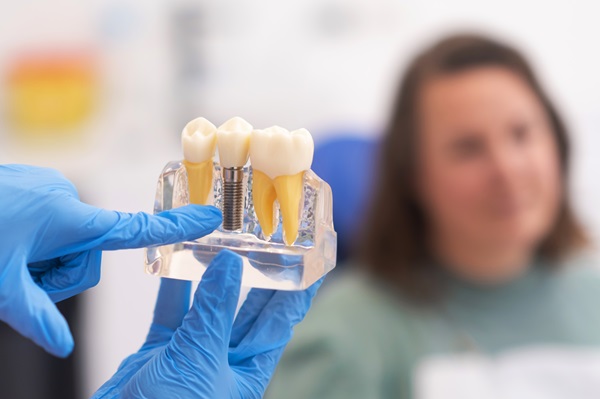Dental Implants

Dental Implants
What are Dental Implants?
Dental implants are small titanium posts that are surgically placed into the jawbone to replace missing tooth roots. These posts are then used to support replacement teeth, such as crowns or bridges. Dental implants can also be used to support dentures, making them more comfortable and secure.
Benefits of Dental Implants
Begin by carefully evaluating the nature and severity of the dental issue. Identify if it’s a knocked-out tooth, severe pain, broken restoration, or any other urgent problem.
Different Types of Dental Implants
Endosteal Implants
These are the most commonly used type of dental implant. They are inserted directly into the jawbone and provide a stable foundation for the replacement teeth. Endosteal implants are usually made of titanium and can be shaped like screws, cylinders, or plates.
Subperiosteal Implants
These are placed on top of the jawbone, rather than within it. A metal frame is fitted onto the jawbone, and the replacement teeth are attached to the frame. Subperiosteal Implants are suitable for people who have a shallow jawbone and are not suitable candidates for bone grafting.
Traditional Vs Immediate Load Implants
Traditional implant placement is a two-stage process that involves surgically placing the implant in the jawbone and allowing it to heal for several months before attaching the replacement tooth. While immediate load implant is a single-stage process that allows for placement of replacement tooth immediately after the implant is placed in the jawbone.
All-on-4 Implants
They are a type of implant-supported full arch reconstruction. Four dental implants are placed in strategic positions in the jawbone to support a full arch of replacement teeth.
Mini Dental Implants
They are smaller in diameter than regular dental implants, and typically used for people who have limited jawbone density or for those who want a less invasive implant procedure.
Zygomatic Implants
These are a type of dental implant used to support full arch restorations in the upper jaw, specifically in cases where there is not enough bone density in the upper jaw. They are anchored in the zygomatic bone (cheekbone) rather than in the jawbone itself.
Reasons why you need Dental Implants:
Missing Teeth
- Dental implants are often used to replace one or more missing teeth. They can be used to fill the gaps left by missing teeth, which can not only improve the appearance of your smile but also prevent the remaining teeth from shifting out of place.
Loose or ill-fitting Dentures
- People who have dentures that are loose or ill-fitting often opt for dental implants as a way to stabilize their dentures and improve the fit.
Tooth Decay
- Dental implants can be used to replace teeth that are damaged or decayed beyond repair. They can also be used to support a bridge or a crown if a tooth is too damaged to be repaired.
Difficulty Eating
- Missing teeth or ill-fitting dentures can make it difficult to eat certain foods. Dental implants can help improve the ability to chew and eat a variety of foods.
Improve Aesthetics
- Dental implants can be used to improve the appearance of your smile. They can be used to replace one or more missing teeth or to support a bridge or denture that can give a person a more natural-looking smile.
Jaw bone loss
- People who have missing teeth for a long period of time may experience jaw bone loss. Dental implants can help in preventing jawbone loss and promoting healthy jaw bone growth.
How do dental implants benefit your overall dental health?
Preventing dental emergencies is essential for maintaining oral health. Here are some simple tips to avoid unexpected dental issues:
How the procedure of implanting works
Initial consultation
During your initial consultation, your dentist will examine your mouth and take x-rays to determine if you are a good candidate for dental implants.
Placement of the implant
The implant is surgically placed into your jawbone during this step. A healing period of several months is usually required before the next step.
Attaching the abutment
Once the implant has fused to your jawbone, the abutment (a small connector piece) is attached to the implant.
Placement of the replacement teeth
The final step is to place the replacement teeth (crown, bridge or denture) on the abutment.
Choosing the Right Dentist for Dental Implants in Orland Park, IL
Are dental implants right for me?
High-quality dental implants can integrate with your existing teeth and with proper care can last the rest of your life. A dental implant can be used to replace a single tooth or potentially all of them. The main question often comes down to cost and commitment to surgery. Dental implants will graft and anchor to your jawline and the tooth will be fitted over the top of it. Typically, there is a temporary tooth in place before being replaced later with a permanent tooth. If you’d like to explore if dental implants are right for you, ask us today!
How do implants prevent bone loss?
When a tooth is extracted, it can cause a shortening of the jaw line as space heals. Removal of several, or all of the teeth can result in a significant shortening of the jawline. Dental implants can reduce a contraction in the jawline as long as it is implanted shortly after the tooth is lost. If the implant is installed later, bone grafting may be necessary to extend the jawline.
Will dental implants look like my natural teeth?
Yes, the goal is seamless integration with your existing teeth. In some cases, the implant is created to match the coloration of your existing teeth?
How do implants help denture wearers?
Dental implants can minimize or eliminate the need to wear dentures. Unlike dentures, you do not remove the implants and can properly care for them with simple brushing and flossing.
Are dental implants approved by the FDA?
Yes, the FDA has determined that dental implants are safe and effective.

